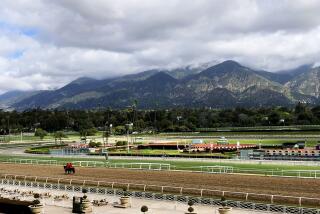Security PacificŌĆÖs Quarterly Profit Declines 27% : Finance: California banks have been weathering the current downturn better than their counterparts elsewhere. Concerns are rising that this may no longer be true.
In a sign that the slowing economy is starting to take its toll on California banks, Security Pacific Corp. disclosed Monday that its third-quarter earnings fell 27%, its first quarterly profit drop since 1987.
Security PacificŌĆÖs problems stem from a continuing slowdown in lending activity, problems in its overseas business and ongoing softness in its Arizona operation. The Los Angeles-based parent of Security Pacific National Bank had warned in August that its earnings would be softer the rest of the year. Still, some securities analysts said the results were a little worse than expected.
Separately, New York banking giant Chase Manhattan Corp. said it lost $623 million in the third quarter, close to what it expected when it disclosed last month a large writeoff due to big real estate problems and other difficulties. By contrast, J. P. Morgan & Co. posted a $208-million profit, attributable to stronger foreign exchange activities and other operations.
California banks have generally weathered the current downturn better than their counterparts elsewhere, with most of their problems coming from out-of-state units rather than California operations. But concerns have been rising among investors that banks in the state are vulnerable to problems in real estate and corporate buyout loans.
Security PacificŌĆÖs three major competitors in the state--First Interstate Bancorp, Wells Fargo & Co. and BankAmerica Corp.--are scheduled to release earnings later this week.
For the third quarter, Security Pacific posted a profit of $135.3 million, compared to $185.1 million in the year-earlier period. For the nine months, earnings fell 5% to $518.9 million. Security PacificŌĆÖs results in the third quarter reflect an increase in its money set aside for possible losses on loans to $240.9 million--up $126.2 million from a year earlier--a move taken to bolster its balance sheet.
Security Pacific in particular cited problems with real estate and business loans in Great Britain and Australia, two countries going through a sharp economic slowdown. Great Britain is especially a problem for lenders, with London plagued by a growing oversupply of office space and worsening problems in the cityŌĆÖs commercial property market.
Security PacificŌĆÖs problems in commercial real estate increased modestly in the quarter. Nonperforming commercial real estate loans--loans that are 90 days or more past due or not accruing interest--increased by $95 million in the United States from June 30 to Sept. 30, $80 million of which was on the East Coast, Southeast and Midwest.
Security PacificŌĆÖs nonperforming loans in commercial real estate now total $753 million, compared to $658 million at the end of the second quarter. Security Pacific did not have the size of its overall commercial real estate portfolio on Sept. 30 available for release Monday. As of June 30, it was $12.1 billion, $6.6 billion of that in California.
A slowdown in corporate lending activity was clear from Security PacificŌĆÖs results. Loan fees, which have played a big role in boosting earnings for California banks the past couple of years, fell $6.4 million in the third quarter from a year earlier. Profits in securities trading, securities-related transaction fees and foreign exchange profits--all sensitive to the growing economic uncertainty caused by the Persian Gulf crisis--were also down sharply.
Ronald I. Mandle, who follows the bank for the Wall Street firm Sanford C. Bernstein in New York, said that the health of California real estate is still the biggest question mark for Security Pacific. He said the California market is showing softness, but at this point ŌĆ£doesnŌĆÖt look like a giant problem.ŌĆØ
In an interview, Security Pacific Chief Executive Robert H. Smith said that despite the decline, the bankŌĆÖs key indicators were good when compared to the rest of the industry and said that some areas of the California real estate market remain healthy.
Smith noted that Security PacificŌĆÖs return on average assets--a key measure of performance--was still 0.78% for the first nine months of the year. (A return on average assets--which measures how efficiently a bank uses its assets--of 1% or above is generally considered excellent, although bank profits lately have been hit hard.)
Despite its disappointing earnings, Security PacificŌĆÖs stock closed Monday at $20 per share, up 37.5 cents in New York Stock Exchange trading. Bank stocks in general gained in the dayŌĆÖs trading.
In other banking-related developments:
* Chase ManhattanŌĆÖs $623-million loss, compared to a loss of $1.1 billion a year earlier that stemmed from boosting money set aside to cover problem loans to developing nations. Chase said it set aside $350 million to cover costs of cutting its work force by 5,000 and for withdrawing from unprofitable businesses.
* J. P. MorganŌĆÖs $208-million profit, compared to a loss of $1.8 billion in the third quarter of 1989, which also was caused by the setting aside of funds to cover problem Third World loans. Morgan said trading of U.S. and other government securities, corporate debt and other investment activities were strong.
* First Chicago Corp. earned $36.2 million, compared to a loss of $23.2 million a year earlier.
More to Read
Inside the business of entertainment
The Wide Shot brings you news, analysis and insights on everything from streaming wars to production ŌĆö and what it all means for the future.
You may occasionally receive promotional content from the Los Angeles Times.










